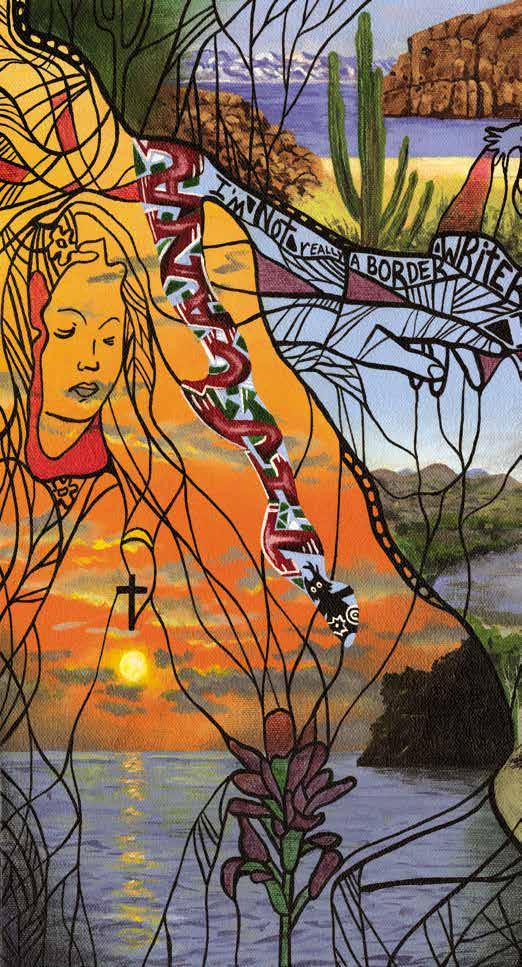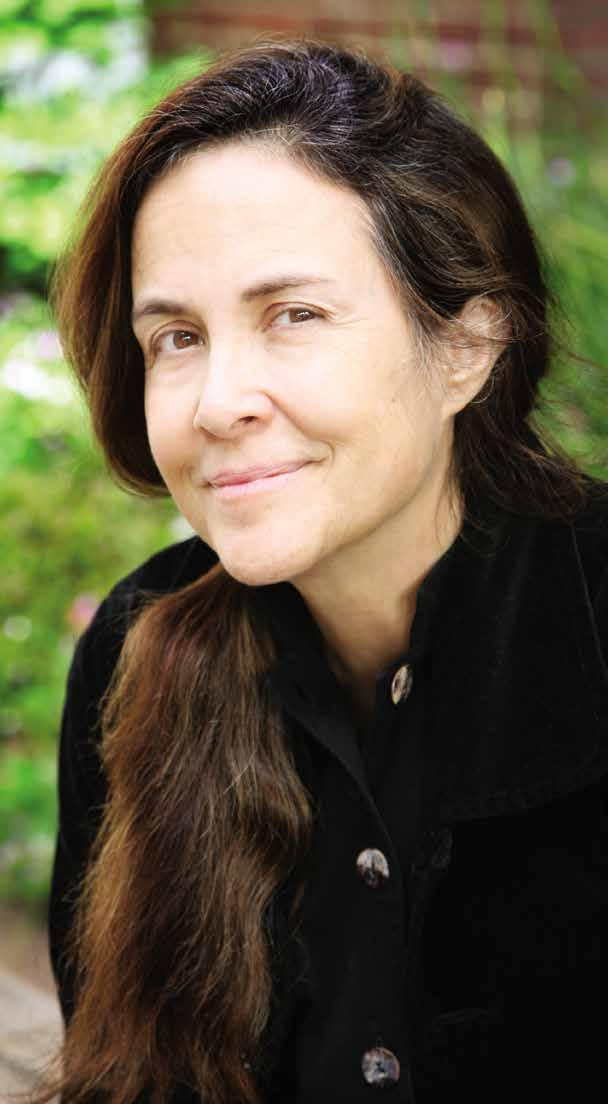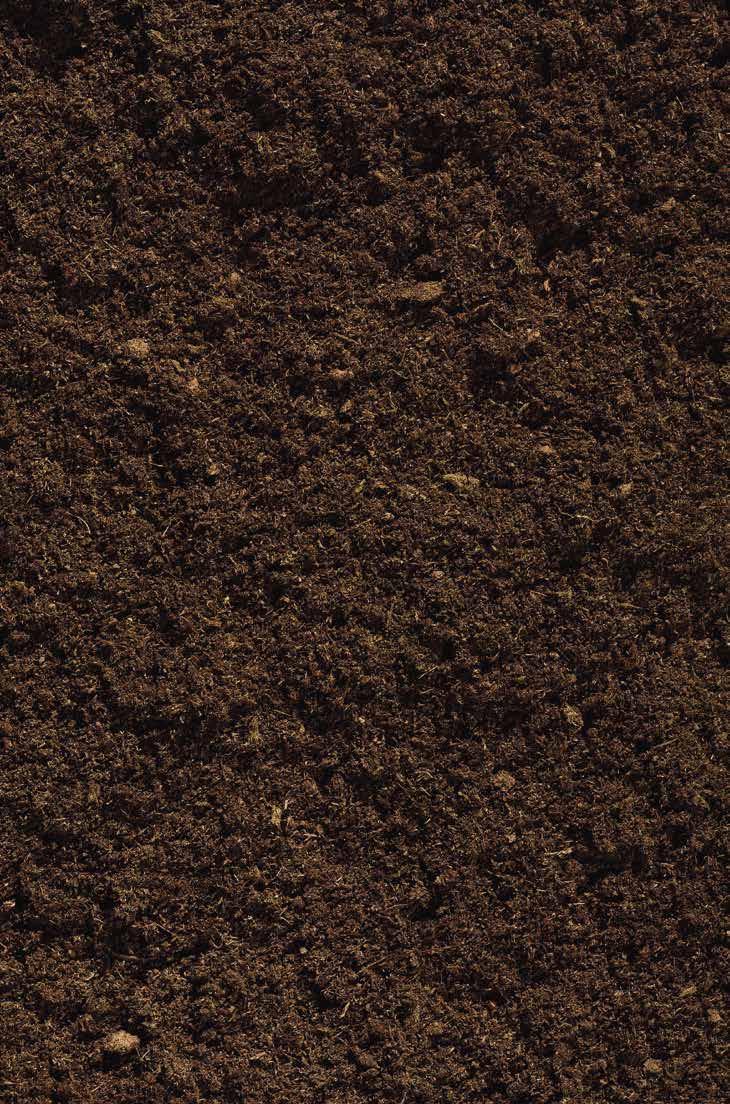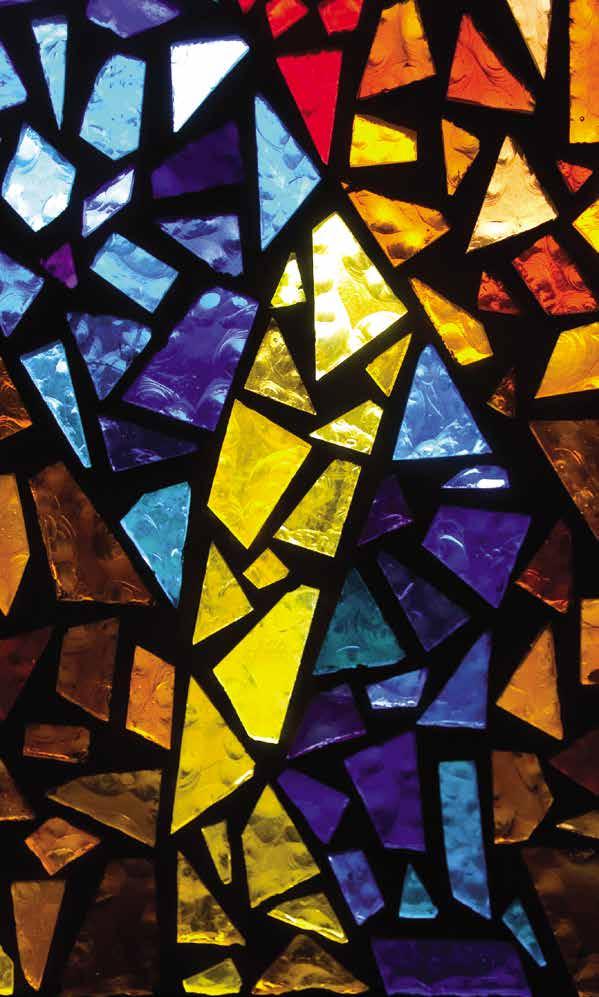
18 minute read
Nobody’s Son
Cover Image: Bridge Builder by Paul Noot © 2012
By Luis Alberto Urrea
Advertisement
Here’s a story about a family that comes from Tijuana and settles into the ‘hood, hoping for the American Dream. It’s a small picture of a few moves in the chess game of disaster. The family game starting to fall apart from the buried rage and broken souls. I’m not saying it’s our story. I’m not saying it isn’t. It might be yours.
They lived at 3935 National Avenue.
When she was feeling well, Mother fed the birds on their narrow strip of lawn. She tore chunks from three or four slices of bread, and she and the boy tossed them out in the middle of the grass. Then they watched through the living room window, hiding behind the edge of the Venetian blinds, as sparrows, pigeons, and the occasional mockingbird descended to squabble over the food. The boy thought the blinds came from Venus.
Their apartment was in the last building of the development, and the pavement of National Avenue didn’t extend to the alley that ran behind their kitchen door. They lived in the lower back corner, in a two-bedroom apartment with a small kitchen/dining alcove and a living room. The boy shared one bedroom with his mother. His father slept in the other room, alone. Outside, there were the kinds of bushes that passed for greenery in Southern California. A dark-leaved hibiscus covered the opening beneath the concrete stairs to the second-story apartments. The boy had his cave there behind the bush. Sometimes, after he’d watched a Hercules movie with his father, he’d climb the outside of the stairway and leap onto the lawn, swinging a plastic sword.
Drunken men sometimes slept on the lawn, dark-skinned skinny men, lying comatose in the creeping sun after some ghetto dance party. On those days, the birds did not come. And the boy watched the men from his window, watched their bony chests rise and fall, watched the stain of urine spread sometimes, watched their fingers curl and their feet twitch as they dreamed. The soles of their feet were yellow, cracked. His mother called them terrible names, and they thought worse things about her but dared not say them.
On the Fourth of July, Dad was usually out with friends, and Mom was too afraid of the neighborhood to walk the mile and a half to the public park for the fireworks. So she’d make popcorn, and she and the boy would climb to the landing halfway up. From there, they could see the colored flashes lighting the sky behind a stand of trees. It looked like lightning inside a cloud, only it was red, violet, yellow, blue. Sometimes, slim puffs of smoke angled out from the tree crowns, and they turned dark before the reflected glow of the explosions. Every once in a while, a bit of the actual fireworks would rise high enough to clear the treetops. It was shocking—like a chunk of the sky catching fire and throwing an ember. Years later, those balmy nights remained precious to him. His mother in her dresses, her dark hair pulled back by a pale headband, flickering in silhouette against the colored sky. She sat primly, knees together, hands in lap, looking over her shoulder. As he stared up at her so lost in the spectacle, she sometimes seemed one hundred feet tall, a sorrowful monument thrown up against the dark.
Burr clover grew all over the lawn. It had tiny yellow flowers, and its tightly rolled burrs could be peeled open if you were patient and careful. You could unroll them, and minuscule yellow-green seeds revealed themselves. The boy often harvested the seeds and put them in his plastic army helmet. Then he’d go to other parts of the lawn and scatter them, trying to make something grow.
There was sourweed in the shade around the base of the biggest bushes. Pill bugs and snails could always be found there, and sometimes beetles. The occasional earwig frightened him—he thought the pincers on their tails meant they were baby scorpions. The pill bugs looked like Volkswagens. He suspected they might be baby armadillos. He picked sourweed stalks and chewed them, his lips puckering at the bitter taste. The black kids said the taste was from dog pee, but he didn’t believe them. He was in third grade.
Across the lawn, Their apartments began. They.
They had some fuchsias and poinsettias left over from the days of white families, but the lawn was already going yellow between the buildings. The landlords sold out to welfare leases, then promptly stopped attending to their buildings. The boy didn’t venture into the further reaches of the complex, but he knew there was a mattress moldering on the lawn at 3930, a broken television set on the walkway at 3929, and a wall coming down at 3925. His father offered reports of each new development when he got home from work.
“There’s a God-damned television out there,” he’d say. “The first thing they buy is a television.”
“Or a Cadillac,” Mom said.
“Then they don’t know how to take care of them,” Dad said.
Mom had decided to block off the stairs. She used potted geraniums— three pots per step, nine in all, because “those people will just walk up to your door and stare in at you. Looking for something to steal.”
One day, while they were out, one of Their fathers came up on the porch and broke every pot. The boy’s family came home to dirt and fragments of brightly painted clay scattered all over the steps. The little geranium twigs lay murdered in the dirt. They reminded him of broken umbrellas. He stood and watched Mom and Dad clean the mess, afraid less of the violence than of his parents’ response to it.
The boy didn’t know what Mom did in there when she sent him out to play. The apartment was usually dark —they didn’t like the blinds open to let in too much sun. His father was off driving a bread truck.
He’d started out as a waiter. Then he’d worked at Chicken of the Sea canning tuna. He was restless. Nothing suited him. He was small, compact. Supercharged. The boy thought his father’s hands had the thickest, strongest fingers in the world.
Now, he was driving a 1961 Chevy panel truck, leased out from Helm’s Bakery. It was two-tone—pale yellow with black fenders—and in back there were large wooden drawers full of doughnuts, cookies, pies, cakes. The area directly behind the driver’s seat had racks of bread and bins of rolls. On the roof of the cab was a little train whistle, and the driver could pull a chain and the truck would go woo-woo.
In spite of his nasty racial views, he couldn’t bear to see the poor mothers on his route. Black mothers. He extended so much credit to them that he was going out of business. He drove longer hours, longer miles, and earned less by a dollar or two a day. He was driving himself to bankruptcy. In the afternoons when Mom came home from work, she’d send the boy outdoors. Then she’d go inside and shut the door and stay shut in until six o’clock, when Dad came home.
And the boy would pull himself slowly out of the dusk, into the painful light of the kitchen.
He liked the back of the apartment more than the front. In the front, there was the cave under the stairs. But the back offered poisonous plants. When he was sure Mom wasn’t looking, he broke open poinsettia stalks and watched the milk seep out. Everyone said it would kill you. It fascinated him. It smelled bland, like the smell in all the other plants when you crumpled their leaves. It also smelled a little like the black soil beneath the rocks at the edge of the alley. He’d almost let the milk touch his fingers before he pulled them away. Death, right in his hand. He thought it might be like falling asleep.
Then, of course, there was the alley. He delighted in the alley—its wide dirt and rock surface was a wilderness to him, a desert in the middle of the neighborhood. When it rained, he saw swamps, dark King Kong rivers teeming with monsters: he sank his plastic dinosaurs in up to their haunches.
The alley sloped downhill and turned left, behind the row of detached garages. At the far end of the garages was a small washroom with two washing machines and two dryers. Dad had the first garage. When he came home from work, the boy raced to the door and pulled it open. Dad drove in and set the hand brake. He and the boy checked the daddy longlegs that hung upside down beneath the dashboard in its paltry web.
“He’s my buddy,” Dad said. “My pet.”
The boy always liked it when Dad was in his gooder mood. Sometimes Dad had his cranky mood, and the whole house turned dark gray inside and nobody spoke too loud. The gooder mood was full of jokes and Bert Kaempfert records. When Mom was in her cranky mood, they would crash together and everything would be broken, lights out, Dad gone, Mom in bed howling boo-hoos, just like in fairy tales. Boo-hoo!
They walked to the rear of the truck.
“Let’s check the inventory,” Dad said.
Yep, definitely feeling gooder today.
He opened the big door at the back and pulled open the top drawer. The indelible odor of bakeries escaped: chocolate, cinnamon, dough. In their wax-paper-lined compartments, doughnuts stood on end, tightly packed.
“I don’t know... “ Dad said. “It seems to me the best doughnut ever made is the glazed.”
“No, Dad,” the boy said. “It’s a chocolate-coated.”
“What!”
“Really.” He pointed at the row of chocolate-coated cake doughnuts, pushed together like the coils of some delicious snake. “The best.”
Dad reached in and plucked a huge glazed one out with a square of wax paper.
“But look at this,” he said. He turned it like some fine piece of jewelry.
“Chocolate,” the boy said.
Dad took out a chocolate doughnut with the other hand.
“No comparison,” he said.
“Cho-co-late, Dad,” the boy said.
Dad shook his head sadly.
“Well,” he sighed. “I suppose we’re going to have to taste them.” He took a bite of the glazed. “Mf,” he said.
The boy grabbed his doughnut from his father and took a bite. The hard chocolate cracked, and the golden fried cake dough broke all over his tongue.
They sat on the back bumper eating their doughnuts, the boy’s legs swinging.
“Mine’s better,” he said.
They got done, slammed the truck door shut, pulled down the garage door, and headed up the alley. It was turning dark His father smelled of sweat and cigarette smoke. He poked the boy in the gut with one finger and said, “Butterball.”
He did not smile.
The boy laughed really loud.
“Wipe your mouth,” Dad said. “And don’t tell your mother I gave you a doughnut.”
The boy’s lips, in the gloom, looked like they were covered in blood.
She was in the kitchen heating TV dinners. Dad always ate turkey with gravy. Mom and the boy ate “fried” chicken, with apple cobbler in one triangular compartment. She was cutting lettuce in small pieces for a salad.
Dad put his lunch bucket on the aluminum table and said, “Hi.” She kept her back to him. The boy shook a little turtle food into the turtle tank. The yellow-eyed turtle inside was stretched out on the plastic ramp beneath the palm tree. “Don’t feed him too much,” Dad said. “You’ll make him fat.”
He rummaged in the fridge.
“Would you like some sherry?” he said, taking a bottle out.
“Oh, a little Thunderbird might be nice,” she said,
He put one bottle back, took out another. He filled two small glasses.
“Can I have a sip?” the boy said.
“No,” Mom said.
Dad said, “Just a little sip.” He winked.
“You want it here or out there?” he said to Mom.
“I’ll join you,” she said.
“Fine,” he said.
She glanced at him.
“Hm,” she said.
Dad took a small soup bowl and emptied a bag of Fritos into it. Then he shook a bunch of cashews into the bowl on top of the Fritos.
“I’ll carry it,” the boy said.
They went into the other room, Dad carrying the glasses, the boy carrying the bowl. They set it all down on a small TV tray table beside Dad’s favorite white chair. He sat and said, “Ah.”
He shook the last Pall Mall out of the pack on the tray.
“Turn on the TV,” he said. “Channel eight. Cronkite.”
The boy switched on the television.
Dad lit his cigarette.
There was a small crash in the kitchen.
“S---,” Mom muttered.
‘That’s nice,” said Dad. “Isn’t that nice, Son, to talk like that?”
Thinking he was in on a joke, the boy said, “Yeah, Mom. Real nice!” He and Dad giggled.
Dad gave him a small sip of Thunderbird.
Mom came in and sat in her chair, placed exactly three feet from Dad’s. Its feet had made four precise little holes in the carpet. She picked up one Frito with her nails and bit it. Then she sipped her drink. She lit a cigarette.
“Aren’t we hilarious?” she said.
Cronkite’s brow was furrowed as he reported on Negro unrest and strange developments in Cuba. “President Kennedy,” he was saying.
“Rub my feet,” Dad said.
The boy sat between his feet and began to unlace Dad’s work shoes. They had thick, rippled rubber soles.
“Must you do that before supper?” said Mom.
“He can wash his hands,” said Dad.
He worked the shoes off. Dad always wore black socks. He had about twelve pairs of identical black socks. He was never without a match in his sock drawer. Still, he carefully rolled each pair together and kept them neat. When he ended up with an extra sock, he threw it away. The boy rolled his socks down, over Dad’s high arches, and off. Dad’s feet were white as grubs. His toes were square and stubby. The boy put the socks inside the shoes.
“Get between my toes,” Dad said.
The boy massaged Dad’s feet, starting on the ball and moving up to the toes then back to the heel. He reached between Dad’s toes and peeled out the tattered little flags of skin blistered up by athlete’s foot. First the right foot, then the left, pushing in between Dad’s toes with his fingertips.
He could tell it felt good.
When things felt good to Dad, he made a little sucking gasp: Sst-unh. Sst-unh.
Dad waited till the boy was absorbed by his work, then he snapped his ear. He liked to flick it with one nail when he wasn’t expecting it, make the kid jump. Old Jug Ear.
“Ow!” the boy said.
Dad laughed, prodded the boy away with his foot.
“Don’t talk back to me,” he said.
“Wash your hands,” Mom said.
As he ran the water over his hands, he could hear them in there sniping at each other. When he turned the water off, it ended. Like magic.
Dinner was served when he came out. Morn and Dad had their small trays of food set on their TV tables, with saucers of salad. Their glasses full of amber liquid jittered as they cut their food.
His supper was set out on the kitchen table. His napkin was folded in a neat triangle. He ate alone.
Whenever he complained, he was told, “You will learn to eat like a decent human being, at a fully set table.”
Mom with her weird little rules.
He stared at the turtle. It stared at him. The batter on the chicken was soggy. It stuck to his mouth. He avoided the compartment with the gray peas and perfectly cubed cooked carrots.
“Drink your milk,” Mom said.
“I will.”
“Want some bread?” said Dad.
“Would you like some bread?” Mom corrected.
“Jesus Christ,” muttered Dad.
He could hear him gobbling his food. Dad breathed through his nose as he ate. He sounded like an engine. He ate like a starving dog. Sometimes the way Dad ate scared him.
“Yeah.”
“Manners,” Mom said. “We won’t have our boy speaking like white trash.”
“Yes,” the boy said. “Please.”
Mom came into the kitchen and buttered two slices of bread. She cut the bread diagonally and set it on a saucer, then placed the saucer on the table. She ruffled his hair.
“How’s supper, Honey?”
“Fine.”
She patted his head.
“That’s good.” Then, suddenly overcome with emotion, she grabbed him in a desperate hug. Her forearm dug into his throat and choked him.
“My eensie-teensie-weensie baby boy,” she said.
She kissed him. He ducked his head away from her. The turtle slid off its ramp and plopped into the water.
“A little more Thunderbird?” Mom called out.
“Don’t you think you’ve had enough?” Dad said.
“Let’s not be ridiculous,” Mom said. “I’ve only had one glass. The way you carry on, a person would think you’re an old woman!”
The boy turned in his chair and looked at Dad.
Dad was staring at the television, his face red. His jaw muscle worked furiously in his cheek. He took a drag on his cigarette and glanced at his son. He let smoke leak out of his mouth.
“Eensie-teensie,” Dad said.
Back to supper. The cobbler was gooey and sweet. He chewed it carefully, in little tiny bites to make it last. The·baked cinnamon apple chunks burst between his molars.
Mom poured herself another little glass.
“Papa’s going bowling tonight,” she said brightly. “Doesn’t that sound like fun?” She walked out of the kitchen. “I can’t imagine a more fascinating evening! So athletic!”
“Have another drink,” Dad said. “Show us how sophisticated you are.”
“Oh, Papa! You have put me in my place.”
“B----, b----, b----,” Dad muttered.
On TV the mystery guest was signing his name on a card. The audience applauded wildly.
“Can I come out?” the boy said.
Dad stubbed out his cigarette butt.
“Bring me a new pack when you come,” he said.
The boy rummaged under the sink, broke open a red carton, and peeled the cellophane off the new pack. He came out and sat between Dad’s legs again. Dad tapped the pack against his knuckle, shaking one cigarette loose.
Dad must have gotten the idea right then—he got those ideas all the time. Real good ones. Creative. He liked to play little pranks, scare his hijo a little, toughen him up. Like, when they were up high, on a cliff above the ocean or on a high bridge, Dad liked to grab him and start to throw him off, yanking him back at the last second. The boy fell for it every time. Dad would go “Whoo!” when he did it. The boy would scream.
Pendejo.
Dad was about to strike the match to light his fresh cigarette. He was looking at the back of the boy’s head, the flatness of it and the cowlick. The boy’s ears drove Dad nuts. Dad put the match on the sandpaper strip, ready to strike it; it had to be perfect for the gag.
Hey,” he said.
“Huh?” said the boy, still staring at the TV.
“Hey. Look.”
The boy turned around.
Dad struck the match and thrust it at his face. Mom shouted. Dad said: “Whoo!” The boy, startled, opened his mouth in a gasp. Dad had already started to laugh. The match went between the boy’s lips as the sulfur ignited. The match head burst into flame, searing the corner of his mouth. His lips sealed around the flame and stuck together. Dad’s eyes widened. The boy clawed at his face, screamed, ran out of the room. Mom knocked over her chair as she ran after him.
“What’d I do?” Dad was shouting.
He sat there in his white chair, waving his cigarette.
“It was a joke, God damn it! What do you think, I did it on purpose?”
He could hear them in the bathroom, making a fuss.
“Stop crying, you baby!” He ate some Fritos.
“It was a God-damned joke!”
“Joke” is a Latin word. “God” is Old English. “Damn” is Latin. “Mother” is Old English, as is “Father,” as is “Son.”
“Family” is Latin.
“Forgive” is English.
William Carlos Williams, that most American of poets, was half Puerto Rican. “Carlos” wasn’t just a New England WASP affectation. He was a Latino, just like me. He was a half-breed, just like me. He was an American. And he said:
“Of mixed ancestry, I felt from earliest childhood that America was the only home I could ever possibly call my own. I felt that it was expressly founded for me, personally, and that it must be my first business in life to possess it.”
America is home. It’s the only home I have. Both Americas. All three Americas, from the Arctic circle to Tierra del Fuego.
I’m not old enough to write my memoir. Yet I’d feel as if I’d cheated if I didn’t try to share some observations. So many of us live in a nightmare of silence. We are sons and daughters of a middle region, nobody’s children, marching under a starless flag. Some of us wave a black flag of anarchy, and others a red flag of revolution. But most of us are waving a white flag of surrender.
My life isn’t so different from yours. My life is utterly alien compared to yours. You and I have nothing to say to each other. You and I share the same story. I am Other. I am you.
So, I’ve offered here a few words about my part of the journey. We’re all heading the same way, after all. Whether we choose to walk together or separately, we’re going toward night. I am lucky. I have the angels of words beside me. So many of us are silent.
Words are the only bread we can really share.
When I say “we,” I mean every one of us, everybody, all of you reading this. Each border patrol agent and every trembling Mexican peering through a fence. Every Klansman and each NAACP office worker. Each confused mother and every disappointed dad.
For I am nobody’s son.
But I am everyone’s brother.
So come here to me.
Walk me home.
From Nobody’s Son: Notes from an American Life, University of Arizona Press, 2002. Reprinted by permission of the author, 2012.









